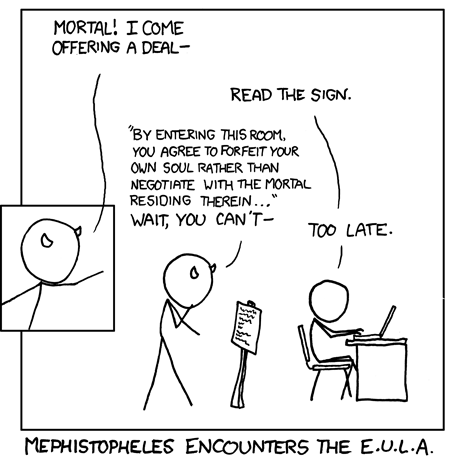Difference between revisions of "501: Faust 2.0"
(→Explanation) |
(→Explanation: Mephisto isn’t just in this one version, and I would argue, that the version by Goethe is much better known, so it’s weird to call him the demon from Marlowe’s version.) |
||
| Line 12: | Line 12: | ||
A {{w|Faustian deal}} is done by someone who sells his soul to the devil for something desired in this life, a textbook example of wanting instant gratification. The mortal will get the things he wanted, but when he dies, have to suffer eternal torment. As the span of a human lifetime is an eyeblink compared to the lifetime of the universe, this is a really stupid thing to do. It is named after the folkloric character Faust, whose story has been the subject of numerous adaptations. | A {{w|Faustian deal}} is done by someone who sells his soul to the devil for something desired in this life, a textbook example of wanting instant gratification. The mortal will get the things he wanted, but when he dies, have to suffer eternal torment. As the span of a human lifetime is an eyeblink compared to the lifetime of the universe, this is a really stupid thing to do. It is named after the folkloric character Faust, whose story has been the subject of numerous adaptations. | ||
| − | In this instance, Cueball turns a E.U.L.A. around on {{w|Mephistopheles}}, the demon | + | In this instance, Cueball turns a E.U.L.A. around on {{w|Mephistopheles}}, the demon Faust sells his soul to in the stories, by posting a sign saying that anyone entering the room agrees to turn over their ''own'' immortal soul rather than negotiate with Cueball for his. It is unknown whether this clause applies only to demons, or to ''everyone''. |
The title text makes reference to how easy it is to cut open one's own hand while trying to open a newly-bought CD case. Incidentally, a pen works just fine, though the blood is referencing how Satanic contracts are signed in blood. | The title text makes reference to how easy it is to cut open one's own hand while trying to open a newly-bought CD case. Incidentally, a pen works just fine, though the blood is referencing how Satanic contracts are signed in blood. | ||
Revision as of 16:46, 20 August 2015
| Faust 2.0 |
 Title text: The only blood these contracts are signed in is from me cutting my hand trying to open the goddamn CD case. |
Explanation
E.U.L.A. is short for End-user license agreement, a license that software makers often attach to their software but people do not usually read. Agreement to a E.U.L.A. is assumed when a user uses the software or service that the E.U.L.A. is attached to, which has led a case where users have unknowingly actually agreed to give away their immortal souls because of a clause in a E.U.L.A. However, in the European Union, all provisions of these agreements that aren't already codified in law actually are not legally enforceable, unless they could be read and agreed to before purchase and first use.
A Faustian deal is done by someone who sells his soul to the devil for something desired in this life, a textbook example of wanting instant gratification. The mortal will get the things he wanted, but when he dies, have to suffer eternal torment. As the span of a human lifetime is an eyeblink compared to the lifetime of the universe, this is a really stupid thing to do. It is named after the folkloric character Faust, whose story has been the subject of numerous adaptations.
In this instance, Cueball turns a E.U.L.A. around on Mephistopheles, the demon Faust sells his soul to in the stories, by posting a sign saying that anyone entering the room agrees to turn over their own immortal soul rather than negotiate with Cueball for his. It is unknown whether this clause applies only to demons, or to everyone.
The title text makes reference to how easy it is to cut open one's own hand while trying to open a newly-bought CD case. Incidentally, a pen works just fine, though the blood is referencing how Satanic contracts are signed in blood.
Transcript
- Mephistopheles: Mortal! I come offering a deal-
- Cueball: Read the sign.
- Mephistopheles: "By entering this room, you agree to forfeit your own soul rather than negotiate with the mortal residing therein..." Wait, you can't-
- Cueball: Too late.
- Caption: Mephistopheles encounters the E.U.L.A.
Discussion
It's also a reference to cd sleeve seals that say "by tearing this seal you agree to the enclosed license agreement" as it is obvious that mephistopheles has already entered the room 173.245.53.163 18:19, 25 March 2014 (UTC)
- What if I cut around the seal? --Alexbuzzbee (talk) 04:14, 21 March 2016 (UTC)
Since angels and demons are pure spirit, and have no body, the mortal now owns the whole demon. 172.68.58.191 (talk) (please sign your comments with ~~~~)
